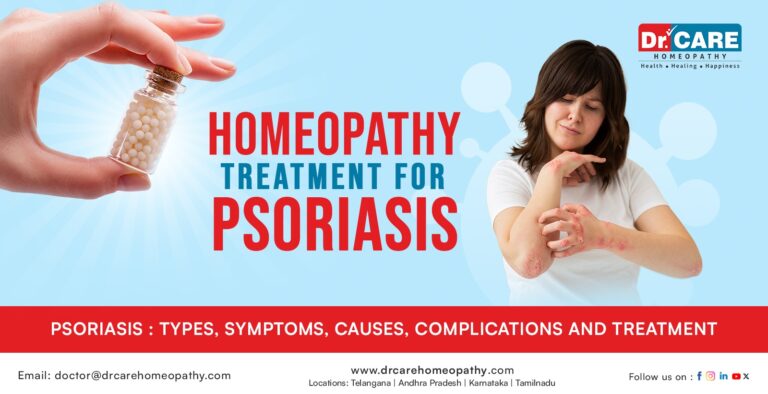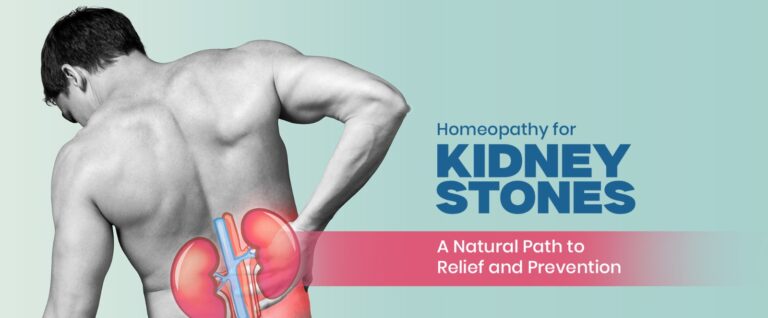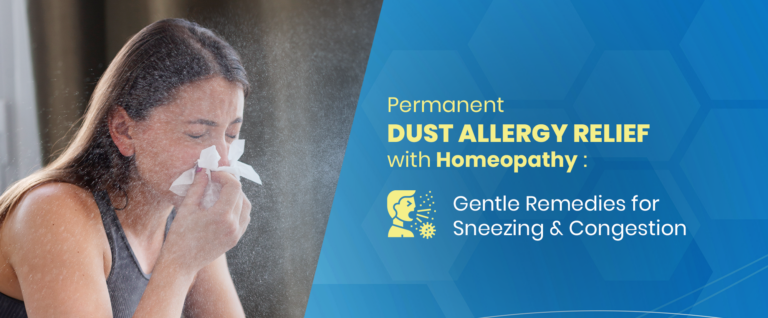Psoriasis is a long-term inflammatory skin condition that causes the skin to become dry, flaky, and itchy. Psoriasis happens when skin cells grow faster than normal. This leads to thick patches and visible scales. These patches can appear anywhere on the body, but they are most often seen on the elbows, knees, scalp, and lower back.
The symptoms of this condition are different for everyone. Some people have only a few small patches that cause mild discomfort. Others may experience widespread flare-ups that affect sleep, daily activities, and confidence. Psoriasis also tends to come and go. You may have weeks or months of calm skin, followed by phases where symptoms suddenly worsen.
While there is no permanent cure, many people find relief through proper care and consistent treatment. With the right approach, it is possible to reduce flare-ups and support healthier skin. Many individuals also look for ways to support psoriasis cure naturally, which involves gentle lifestyle habits and holistic care.
In this blog, we will walk through the causes, symptoms, diagnosis, homeopathic management, natural skin-care tips, prevention strategies, and long-term relief options to help you understand psoriasis better and manage it with confidence.
What is Psoriasis?
Psoriasis is an autoimmune skin disorder, which means the body’s immune system becomes overactive and starts affecting healthy skin cells by mistake. Because of this, the skin cells multiply much faster than normal. Instead of taking about a month to rise to the surface and shed, new cells appear within a few days. This leads to a buildup of thick, scaly patches on the skin.
These patches can look red, pink, purple, or dark brown depending on the skin tone, and the scales may appear white, silver, or grey. Psoriasis often goes through phases—times when symptoms flare up and times when they become mild or seem to disappear.
Understanding the Skin Cell Turnover Cycle
In healthy skin, old cells slowly move up, fall off, and are replaced by new ones. This cycle usually takes 3–4 weeks.
In psoriasis, this process happens 5–10 times faster. The skin doesn’t get enough time to shed naturally, so extra cells pile up, causing visible plaques, irritation, and dryness.
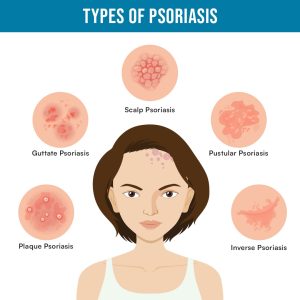
Types of Psoriasis
Psoriasis can appear in different forms, and each type has its own pattern and severity:
- Plaque Psoriasis:
The most common type. It causes raised, inflamed patches with scales. These patches can look different depending on skin tone. - Guttate Psoriasis:
Appears as small, drop-shaped spots. It often starts after infections like a sore throat and is more common in children and young adults. - Inverse Psoriasis:
Found in skin folds such as the armpits, groin, or under the breasts. The patches are smooth and shiny without scales. - Pustular Psoriasis:
Shows up as white, pus-filled bumps surrounded by red or swollen skin. Although it looks severe, it is not contagious. - Erythrodermic Psoriasis:
A rare but serious form that affects most of the body. It causes intense redness, shedding, and discomfort, and may need urgent medical care. - Scalp Psoriasis:
Affects the scalp, causing flakes, dryness, and itching. It may extend to the forehead, neck, or ears. - Nail Psoriasis:
Causes pitting, discoloration, thickening, or changes in the structure of the fingernails or toenails.
Severity Spectrum
Psoriasis varies widely in how much it affects the body:
- Mild: Less than 3% of the body
- Moderate: 3–10% of the body
- Severe: More than 10% of the body
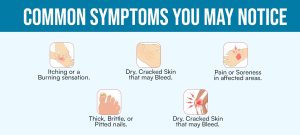
What are the common signs and symptoms of Psoriasis?
Psoriasis shows up in many ways, but the most well-known sign is the formation of plaques. These are raised, thick patches of skin that look flaky or scaly. The color of these patches can differ based on skin tone—they may look pink, red, purple, or dark brown, with white, silver, or grey scales on top.
In the early stages, you may notice tiny bumps that slowly grow larger. As the skin builds up, scales form on the surface. These scales may shed easily, but the layers underneath often stay stuck together. If you scratch them, the skin can tear and bleed, leading to more irritation.
Psoriasis symptoms can range from very mild to quite severe. Some people have only a few small spots, while others have large, uncomfortable patches that affect daily life.
Common Symptoms You May Notice
Along with visible plaques, psoriasis can cause:
- Itching or a burning sensation
- Dry, cracked skin that may bleed
- Pain or soreness in affected areas
- Thick, brittle, or pitted nails
- Joint pain or stiffness in some people
Psoriasis also tends to come in cycles. You may have a flare that lasts for weeks or months, followed by a quieter period where symptoms settle down.
Scratching can cause the skin to break and increase the risk of infection. If you notice severe pain, swelling, warmth, or fever, it may indicate an infection that needs medical attention.
Every person experiences psoriasis differently. Some may only see mild flaking on the scalp, while others may have widespread plaques. Recognising your symptoms early can help you manage flare-ups more effectively.
When Should You See a Doctor?
- When your psoriasis flares up suddenly or worsens quickly
- When you notice large areas of scaling or widespread patches
- When your skin is painful, cracked, or bleeding and not improving
- If you have joint pain, stiffness, or swelling, that may suggest psoriatic arthritis
- If the changes in your skin are affecting your confidence or emotional well-being
- When home care or regular treatment is not helping
- Whenever a rash does not settle or keeps coming back
What Causes Psoriasis?
Psoriasis develops when the immune system becomes overactive and starts reacting against the body’s own skin cells. This triggers inflammation and speeds up the skin cell cycle. Instead of shedding every few weeks, new cells reach the surface in just a few days. As a result, old cells build up and form thick, scaly patches. Although the exact cause is not fully known, several factors work together.
Key causes include:
Autoimmune dysfunction: The body mistakenly attacks healthy skin cells, leading to rapid skin growth.
Genetics: Psoriasis often runs in families. A parent or grandparent with psoriasis increases your chances of developing it.
Triggers that activate the immune system: Certain situations can start a flare or make existing symptoms worse. These may include:
- Stress
- Hormonal changes (puberty, menopause, postpartum)
- Infections like strep throat
- Certain medications
- Skin injuries such as cuts, scrapes, or sunburn
- Sudden withdrawal of steroid creams
Environmental factors: Cold, dry weather, sunburn, and weight-related skin folds can all increase flare-ups.
Psoriasis is not contagious. You cannot catch it from another person or spread it through touch.
Risk Factors for Developing Psoriasis
Anyone can develop psoriasis, but some people are more likely to get it because of certain internal and external factors. Understanding these risks can help you manage triggers better.
Major risk factors include:
- Family history: Having a parent or close relative with psoriasis increases your risk.
- Stress: Emotional strain can push the immune system into overdrive and trigger symptoms.
- Smoking: Tobacco use can double the risk and may worsen certain types, such as pustular psoriasis.
- Alcohol: Heavy drinking can make psoriasis harder to control and reduce treatment effectiveness.
- Cold, dry climate: Winter weather, indoor heating, and dry air often cause flare-ups.
- Obesity: Extra weight can worsen symptoms, especially in skin folds.
- Infections: Conditions like strep throat, tonsillitis, and respiratory infections can trigger psoriasis, especially in children.
- Skin injury or trauma: Even minor injuries such as mosquito bites, scratches, or burns can lead to new patches.
How is psoriasis diagnosed?
Psoriasis is usually diagnosed through a simple check of your skin. Your doctor or dermatologist will look closely at the patches, ask about your symptoms, and check if anyone in your family has similar skin concerns. Most times, the appearance of the rash is enough to make the diagnosis.
If the signs are not very clear, your doctor may take a small sample of your skin, called a biopsy. This is done in the clinic with a numbing injection to keep you comfortable. The sample is then examined under a microscope to confirm that the changes match psoriasis and not another skin condition.
In some cases, if joint pain or stiffness is present, your doctor may check for psoriatic arthritis. They may also ask about your daily products, when your symptoms started, and if you’ve tried any home remedies. These details help them understand the full picture and guide the right treatment plan.
What are the Conventional Treatment Options?
In psoriasis care, conventional medical treatments are often used to manage flare-ups and reduce discomfort. These may include topical creams to soothe scaling, light therapy to calm inflammation, and oral medicines for more persistent symptoms. In severe cases, biologic injections may be recommended.
Homeopathy Treatment for Psoriasis
Homeopathy offers a gentle and holistic way to manage psoriasis. It does not just focus on the skin. Instead, it looks at the root causes, like immune imbalance or stress. Every person gets a personalised remedy based on their symptoms and health history. This makes psoriasis homeopathy treatment a safe and effective long-term option.
Homeopathic medicines are natural and non-invasive. They have very few side effects. Many people also feel better overall because homeopathy strengthens the body’s natural healing ability.
Common Homeopathic Medicines Used for Psoriasis
Homeopathy takes a gentle, holistic approach to psoriasis by addressing the root imbalance rather than just the visible skin changes. Remedies are chosen based on each person’s unique symptoms, emotional triggers, and overall health. Here are some of the most commonly used homeopathic medicines for psoriasis:
- Arsenicum Album: Often chosen for dry, scaly skin with burning and itching, especially when stress triggers flare-ups. It helps calm irritation and improve skin comfort.
- Sulphur: Used for red, itchy, inflamed patches, including scalp psoriasis. It supports soothing of the skin and reduces constant itching.
- Graphites: Suitable for thick, cracked, or rough skin, particularly in folds and joints. It helps soften the skin and ease dryness.
- Calcarea Carbonica: Helpful for very dry, flaky skin on the scalp or face. It works by supporting overall immune balance and healthier skin.
- Rhus Toxicodendron: Used when itching, redness, and small blisters worsen in cold or damp weather. It helps settle irritation and ease stiffness around affected areas.
Psoriasis Treatment in Homeopathy: Long-Term Relief at Dr. Care Homeopathy Clinic
At Dr. Care Homeopathy, we offer safe and natural homeopathic care to help manage psoriasis from the root. Our approach focuses on calming the overactive immune response, reducing flare-ups, and improving overall skin health. Since every person experiences psoriasis differently, we create personalized treatment plans to match each individual’s symptoms and needs.
Our remedies help ease common concerns such as itching, scaling, redness, and dryness, while supporting better immunity and long-term skin healing. The treatment is gentle, non-invasive, and suitable for ongoing use without harsh side effects.
With over 22 years of experience in holistic healing, Dr. Care Homeopathy is trusted for providing effective care. Our team of expert homeopathic doctors and customized treatment methods has supported over 44 lakh patients across the country.
Lifestyle Changes to Manage Psoriasis
- Maintain a healthy weight to support better treatment response and reduce flare-ups.
- Follow an anti-inflammatory diet with lean proteins, omega-3-rich fish, nuts, and seeds.
- Limit foods that worsen inflammation, such as red meat, refined sugar, and highly processed foods.
- Reduce alcohol intake, as it can trigger or worsen symptoms.
- Keep your skin moisturised daily to reduce dryness and itching.
- Practice stress-relief activities like yoga, meditation, walking, or deep breathing.
Preventive Measures to Reduce Flare-Ups
- Identify and avoid personal triggers, including certain foods or skincare products.
- Avoid smoking and limit alcohol to support overall skin and immune health.
- Protect your skin from injuries, sunburns, and harsh weather.
- Choose gentle soaps and shampoos that do not irritate the skin.
- Stay hydrated and maintain a balanced, nutrient-rich diet.
- Get moderate sun exposure when possible, or consider travelling to warmer climates during winter if feasible.
Complications Associated with Psoriasis
Psoriasis can sometimes affect more than just the skin. Some people may develop related health issues, especially if the condition is long-standing or severe.
Possible complications include:
- Psoriatic arthritis
- Obesity
- Type 2 diabetes
- High blood pressure
- High cholesterol
- Heart disease or heart attacks
- Eye issues like conjunctivitis
- Mental health concerns (stress, anxiety, low self-esteem)
- Other autoimmune conditions (Crohn’s disease, celiac disease)
Early management and regular checkups can help reduce the risk of these complications.
Conclusion
Managing psoriasis becomes easier when you understand your triggers, care for your skin consistently, and choose a treatment approach that supports long-term balance. Homeopathy offers a gentle, personalised way to address this condition from within, making psoriasis homeopathy treatment a safe and holistic option for many individuals. With expert guidance and steady care, flare-ups can be reduced, and skin health can steadily improve.
At Dr Care Homeopathy, we focus on treating the root causes and improving your overall well-being. With experienced doctors, natural remedies, and patient-centred care, we are committed to helping you get long-term relief. Our clinic is known as the best homeopathy clinic for psoriasis, trusted by thousands for effective and compassionate treatment.
Frequently Asked Questions
- Can you suggest homeopathy brands specializing in psoriasis care?
Dr Care Homeopathy is among the many homeopathy brands specializing in psoriasis care. They have years of experience treating various conditions through holistic care.
- What deficiency causes psoriasis?
Psoriasis is not caused by any single deficiency. However, vitamin D deficiency is commonly found in patients who have psoriasis.

